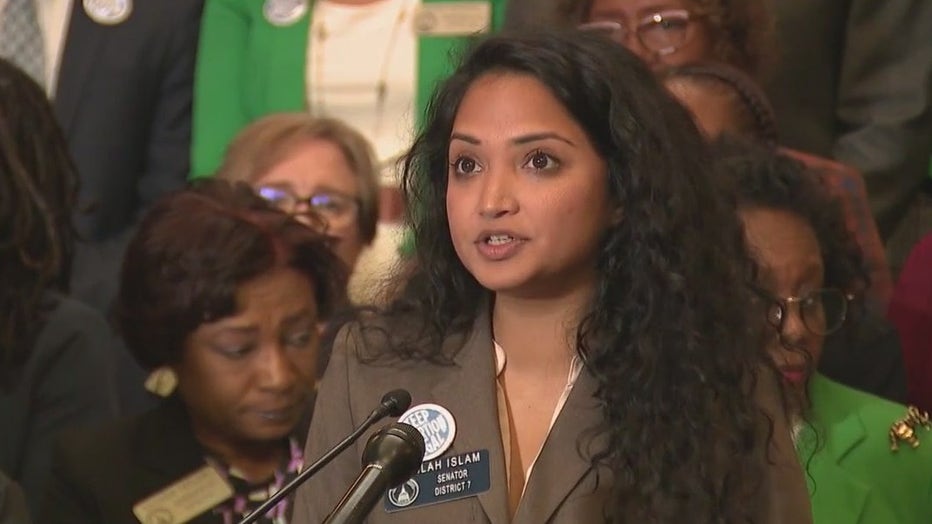Reproductive Freedom Act introduced in Georgia legislature
Ga. abortion advocates, lawmakers, healthcare providers call for Reproductive Freedom Act
Georgia abortion advocates, lawmakers and healthcare providers held a press conference Tuesday calling for a legislation that would repeal HB 481, the Georgia law that resulted in a near-total abortion ban, and other abortion restrictions enacted since 2005.
ATLANTA - A coalition of Democratic Georgia lawmakers, reproductive healthcare providers and abortion rights advocates held a news conference to call for passage of the Reproductive Freedom Act, two days after what would have marked a significant milestone for Roe v. Wade.
"Sunday, we should've celebrated the 50th anniversary of the Roe v. Wade decision," Democratic state Sen. Nabilah Islam said. "Instead, we have to be out here fighting the same fights our mothers and grandmothers have fought for, to control the rights to their own bodies."
In the case of Roe v. Wade, the US Supreme Court granted individuals, rather than the government, the right to decide whether to terminate or continue a pregnancy back in 1973. In June 2022, the decision was overturned using the court ruling of Dobbs v. Jackson Women's Health Organization. Abortions were not determined to be an extension of privacy, therefore not a constitutional right. State officials were then able to turn to their U.S. Appeals courts to introduce bills, like Georgia's so-called "Heartbeat Bill" for their own constituents.
STATE BY STATE: ABORTION LAWS ACROSS U.S.

Democratic State Senator Nabilah Islam (FOX 5 Atlanta)
Since then, reproductive rights activists around the country have been rallying and protesting.
Georgia House and Senate Democrats co-sponsored an act to repeal Georgia's anti-abortion bill that became law over the summer and has resulted in a near-total abortion ban and other abortion restrictions enacted since 2005. On Tuesday, they met up to discuss its importance to them.

Democratic Representative Kim Schofield. (FOX 5 Atlanta)
Democratic Rep. Kim Schofield revealed she had an abortion years ago and said women, not the government, should have the right to decide what happens to their bodies.
"As we move forward, I want all women to have a safe, effective abortion, with dignity," said Rep. Schofield.
The bill's sponsors say Georgians are now even more likely to experience increased health risks and economic hardship due to delayed care and lack of access to reproductive health care.
"It is time," said Rep. Shea Roberts, "That we look beyond Roe and work toward a future where all Georgians can live with an abundance of freedom."

Photo shows a sonogram. (FOX 5 Atlanta)
What is HB 481?
Commonly called "Georgia's Heartbeat Law," but formally called the "Living Infants Fairness and Equality (LIFE) Act," Gov. Brian Kemp signed HB 481 into law in June 2019 to ban most abortions by six weeks into pregnancy, when there is a "detectable human heartbeat."
The law prohibited most abortions once a "detectable human heartbeat" is present. However, since medical professionals say cardiac activity can be detected by ultrasound in cells within an embryo that will eventually become the heart as early as six weeks into a pregnancy, that meant most abortions in Georgia would be illegal before many women knew they were pregnant.
The law made an exception for cases of rape and incest if a police report was made first, and when the mother's life is at risk or a serious medical condition renders a fetus unviable.
HB 481 also addressed with alimony, child support, and even income-tax deductions for fetuses, declaring that "the full value of a child begins at the point when a detectable human heartbeat exists."
In November 2022, a Fulton County judge overturned the ban.
Fulton County judge overturns Georgia's six-week abortion ban
A Fulton County judge overturned the Georgia’s so-called heartbeat law that bans abortion before most women know they're pregnant. Superior Court Judge Robert McBurney called the law "unconstitutional."
What is the Reproductive Freedom Act?
The Reproductive Freedom Act, RFA, aims to take Roe v. Wade a step further, not only giving American women the right to make their own decisions about pregnancy, but also making access to abortions easier for anyone, regardless of gender identity or immigration status.
The act is triple tiered, focusing on protection of rights, rolling back restrictions and expanding access. Activists say RFA would ensure abortion coverage in Medicaid and Obamacare insurance, eliminate Georgia's waiting period requirements and allow nurses and physician assistants to provide abortions.
Pro-life critics of the act maintain having an abortion is not an inalienable right protected by the constitution.
"Our state values life from conception to natural death," Gov. Kemp said when floor leaders Jodi Lott, R-Evans, and Dominic LaRiccia, R-Douglas, introduced pro-life legislation to the Georgia General Assembly on Feb. 28, 2019.
"We are doing everything we can because life matters, and we love each and every person because they matter to God, therefore they matter to us," said former State Rep. Sheri Gilligan, R-Cumming, said during a rally at the state Capitol when a draft of the Supreme Court decision against Roe v. Wade was leaked last May.

